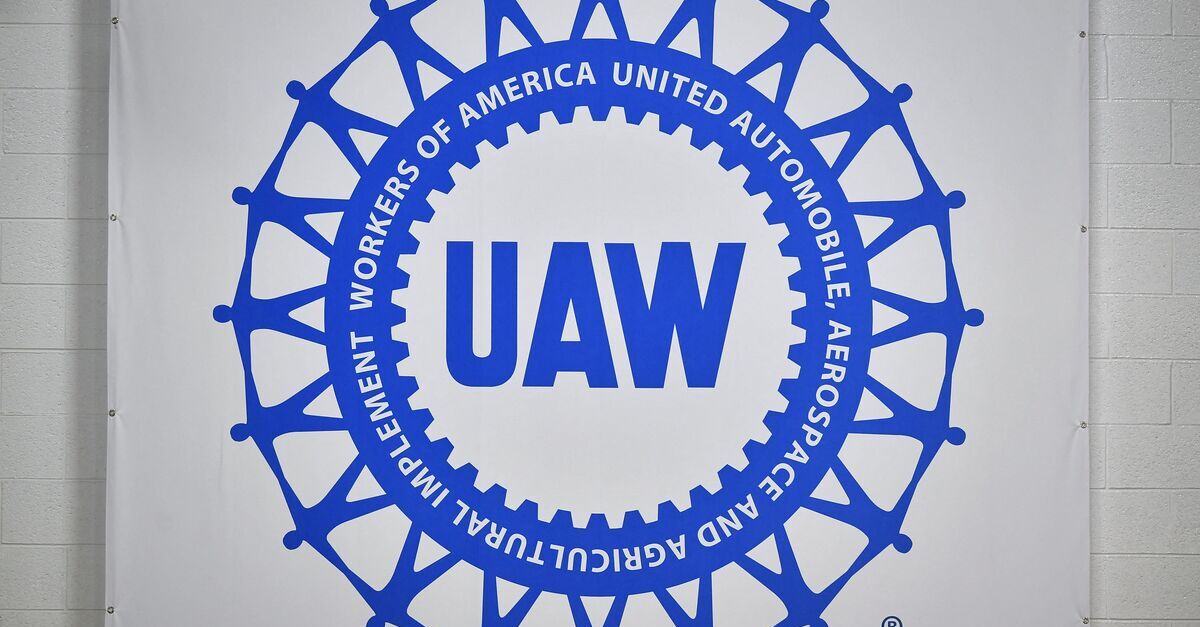
The logo of the United Auto Workers union (UAW) is seen during a tour by the US president of the General Motors Factory ZERO electric vehicle assembly plant in Detroit, Michigan on November 17, 2021.
A federal judge in Detroit on Tuesday signed off the results of a union election last year wherein members overwhelmingly voted to directly elect their leadership–a stark change from decades past.
In December 2021, the International Union, United Automobile, Aerospace, and Agricultural Implement Workers of America, known as the United Auto Workers in common parlance or UAW, overwhelmingly voted to adopt a “one member, one vote” system for electing officers, replacing the prior delegate-based system of elections.
“The Court,” U.S. District Judge David Lawson of the U.S. District Court for the Eastern District of Michigan wrote, “has considered the record submitted by the parties and is satisfied that the election properly was conducted, and that the monitor’s adequate supervision of the process provides sufficient assurance that the election results faithfully represent the desire of the union’s members to alter the method of electing officers for the union’s executive board.”
By validating the lopsided 64-36 vote in favor of direct elections, the judge ushered in an “historic change” long-clamored for by union families and the U.S. Department of Justice alike.
Union members have been agitating and organizing for democracy in their union since the mid 1980s. Long stymied by union bosses–who were often viewed by their members as having cozied up far too close to owners and employers–holding the vote was actually a condition of a consent decree issued by the DOJ after federal investigators vindicated suspicions held by the rank-and-file about their leadership.
Following years of investigations and prosecutions, 15 people, including two former UAW presidents, were convicted in the corruption probe. Federal agents discovered widespread embezzling of union funds for personal use during the expansive inquiry. And, in at least two instances, union officials accepted bribes and kickbacks from Fiat Chrysler Automobiles (now Stellantis) in order to secure sweetheart deals for capital while selling out union members.
“We designed the Consent Decree so that the members of the UAW would be able to decide for themselves how they would choose their leaders going forward, rather than having the government impose one system or another,” U.S. Attorney Dawn Ison said in a press release praising the court’s order. “Now that the members have spoken and chosen a system of direct elections, we will continue to work with the Monitor to ensure that the UAW is fully reformed, free of corruption and fraud, and that the union’s elections will be fair and in compliance with the will of the membership.”
The UAW was able to fend off a full-on government takeover when they struck a deal with the DOJ in 2020 that put the storied union into a six-year consent decree, essentially a probationary regime whereby the government will retain significant oversight of the organization.
“The defendant union acknowledges that there have been criminal convictions, allegations, sworn testimony, and judicial findings of past problems with fraud, corruption, and criminal conduct by certain officials within the UAW and certain of its related entities,” the consent decree notes. “By bringing certain criminal prosecutions and related proceedings, the United States has halted and punished past fraud, corruption, and criminal conduct, and the parties enter into this agreement to ensure that no further unlawful activity occurs.”
That document also outlines the next steps for the implementation of the newly-approved system of elections and governance:
If the membership of the UAW chooses the “one member, one vote” principle through the referendum, the UAW Constitution shall be amended to incorporate that principle with respect to its IEB elections prior to the next [International Executive Board] elections taking place at or following the next UAW Constitutional Convention in June 2022. In such case, the Monitor will promptly confer with the UAW to draft language amending the UAW Constitution affirming the “one member, one vote” principle for inclusion in the UAW Constitution at the next UAW Constitutional Convention.
If the membership of the UAW chooses the “one member, one vote” principle through the referendum, the Monitor, in consultation with the UAW, shall develop all election rules and methods for the election of members of the IEB during the period of oversight.
In other words, the electoral system will be developed by court-appointed monitor Neil Barofsky in consultation with the union.
“The UAW membership has voted for a significant change in how its leadership is selected, consisting of a system of direct elections,” Acting Special Agent in Charge Josh P. Hauxhurst said. “The FBI will continue to work alongside our law enforcement partners, the Monitor, and the UAW to ensure future elections, and the UAW as a whole, remain free from corrupt influence.”
[image via MANDEL NGAN/AFP via Getty Images]